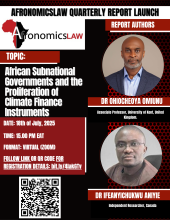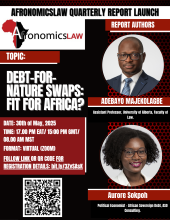Sovereign Debt News Update No. 147: The Promises and Transparency Pitfalls of Kenya’s $1 Billion Debt-for-Food Swap
Kenya’s proposed debt-for-food swap represents a strategic convergence of fiscal reform and humanitarian need, offering a potentially transformative pathway to ease macroeconomic pressure while addressing food insecurity. However, the promise of such innovative instruments cannot be realized without robust transparency and public accountability. The government’s vague references to “advanced stages” of negotiation, coupled with the absence of clear details on the structure, costs, and stakeholders involved, undermine public trust and violate the principles of good governance. As Afronomicslaw’s case before the EACJ highlights, transparency is not a procedural formality, it is a democratic imperative. Without full disclosure and meaningful public participation, the true benefits of debt swaps cannot be assessed, and the risk of mismanagement or corruption remains high. Sustainable financing must be matched by sustainable governance where citizens are informed, engaged, and empowered to shape the decisions that affect their future.




